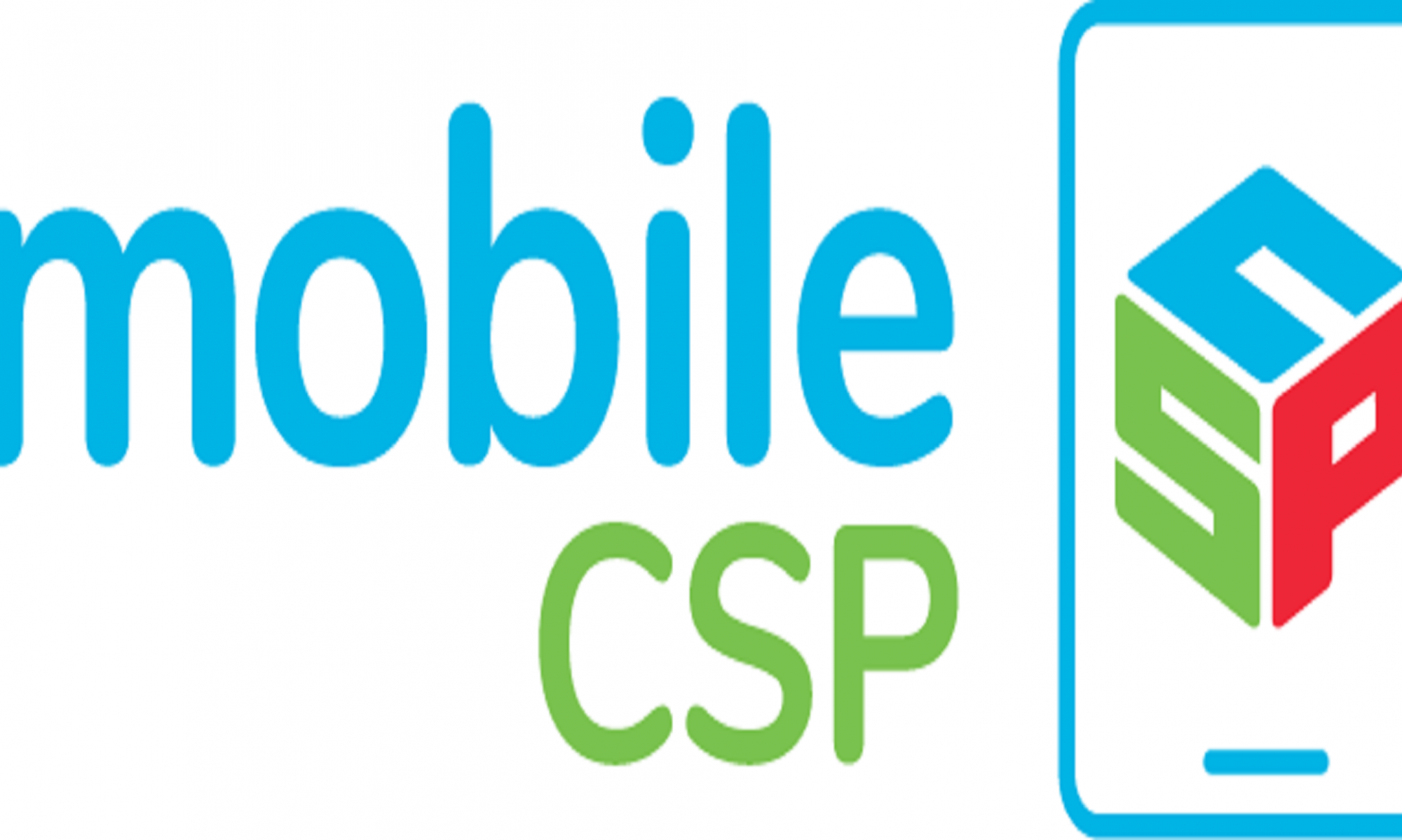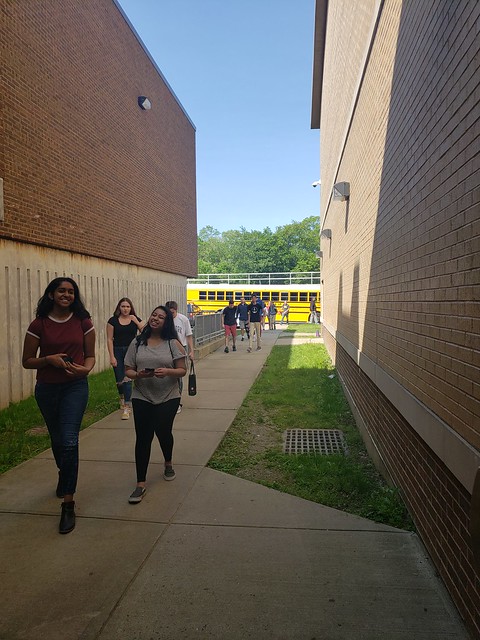MIT App Inventor: The Road to iOS
For educators who use MIT App Inventor in their classrooms, it can be a real struggle if your students or your school uses iOS devices. Since its inception, MIT App Inventor has been known for Android app development. When the MIT App Inventor team first announced the plans to also have iOS capabilities, App Inventor supporters and educators alike rejoiced. But, since then, the road to iOS has been a long one to say the least.
The Big Announcement
Nearly two years ago in November/December 2017, the MIT App Inventor team announced that MIT App Inventor was working for testing on iOS devices. Included in the announcement were a series of phases to be carried out along with a call for help with donations to support the project. A short video released on their social media channels showed great promise as an Apple device successfully connected to MIT App Inventor over wifi with the companion app. The caption on the video indicated the hope for release/testing in spring 2018.
A Glimmer of Hope
Back in February 2019, Evan Patton at MIT released a blog post announcing that MIT App Inventor for iOS had entered beta testing. Finally after lots of back and forth with Apple, things had progressed. Eager beta testers (including several Mobile CSP team members) began seeking access to the TestFlight companion app and helped report bugs that were found. At that point in time, it seemed like the public release of the iOS companion app was within reach.
Delayed by Apple
Heading into Summer 2019, there was doubt that a public release would even happen. Evan Patton informed the Mobile CSP team that the back and forth with Apple continued. He confirmed what we already knew: the iOS version for MIT App Inventor was ready to go, but Apple was not approving the public release. However, Evan understood that many teachers and students were so badly wanting the iOS version and that he needed to find a way to make it happen…somehow.
If Plan A fails, Try Plan B
In August 2019, MIT App Inventor celebrated 10 years of computational action as they hosted the MIT App Inventor Summit 2019. At the summit, Evan gave another update on the iOS version and announced his plan for a plan b. Mobile CSP Team member Beryl Hoffman informed the Mobile CSP community shortly after in an email:
Things are at a stand-still with Apple, so [Evan] is going to release the latest iOS Companion as open source for teachers to use in their classrooms mid-August. To use the open-source, you will need to get an iOS developer’s license for $99 a year and then input all your students’ iOS devices as development devices on that license. This is temporary until they can get through Apple approval, but it will allow you to test it in your classes this year… You can register 100 devices on one license so we could possibly set up sharing of licenses too. More info in a couple weeks.
-Beryl Hoffman 08/04/2019
Where We Are At Now
MIT App Inventor is, and will remain, a free (open source) software. The MIT App Inventor team is still working with Apple to get the iOS companion app released publicly for free just like it’s Android companion app counterpart. The MIT App Inventor team announced the latest version of the companion of iOS available via Apple TestFlight. Those who wish to try out MIT App Inventor on iOS currently have two options:
- Option 1: Become a beta tester and use the Apple TestFlight version of the iOS companion app (don’t forget to mention Mobile CSP)
- Option 2: Use the iOS companion preview (requires an iOS developer’s license from Apple)
While option 1 is free, the MIT App Inventor team does ask that you be willing to provide feedback on bugs and other issues you may encounter to help them improve the companion app.
With the iOS companion preview (option 2), you can create and install on your iOS devices if you purchase an iOS developers’ license ($99 per year with a waiver program available for schools). [Note: This fee is an Apple fee and is not from MIT App Inventor.] Up to 100 devices can be added to a single license and a license can be shared among teachers. This option is currently working for Apple devices running iOS versions 9-13. If you plan to use the preview version and wish to report feedback/bugs, please fill out this form so that we can send the feedback to MIT.
The Mobile CSP team will continue to work closely with the MIT App Inventor team. However, although the MIT App Inventor Team may value and use our input, we are not a decision maker in terms of how MIT App Inventor handles iOS.
Helpful Resources
- Instructions for using the iOS preview companion: coming soon!
- Apply for an iOS Developer’s license: https://developer.apple.com/programs/
- Program to waive the $99/year fee for schools: https://developer.apple.com/support/membership-fee-waiver/
Mobile CSP’s 6th Annual App Expo
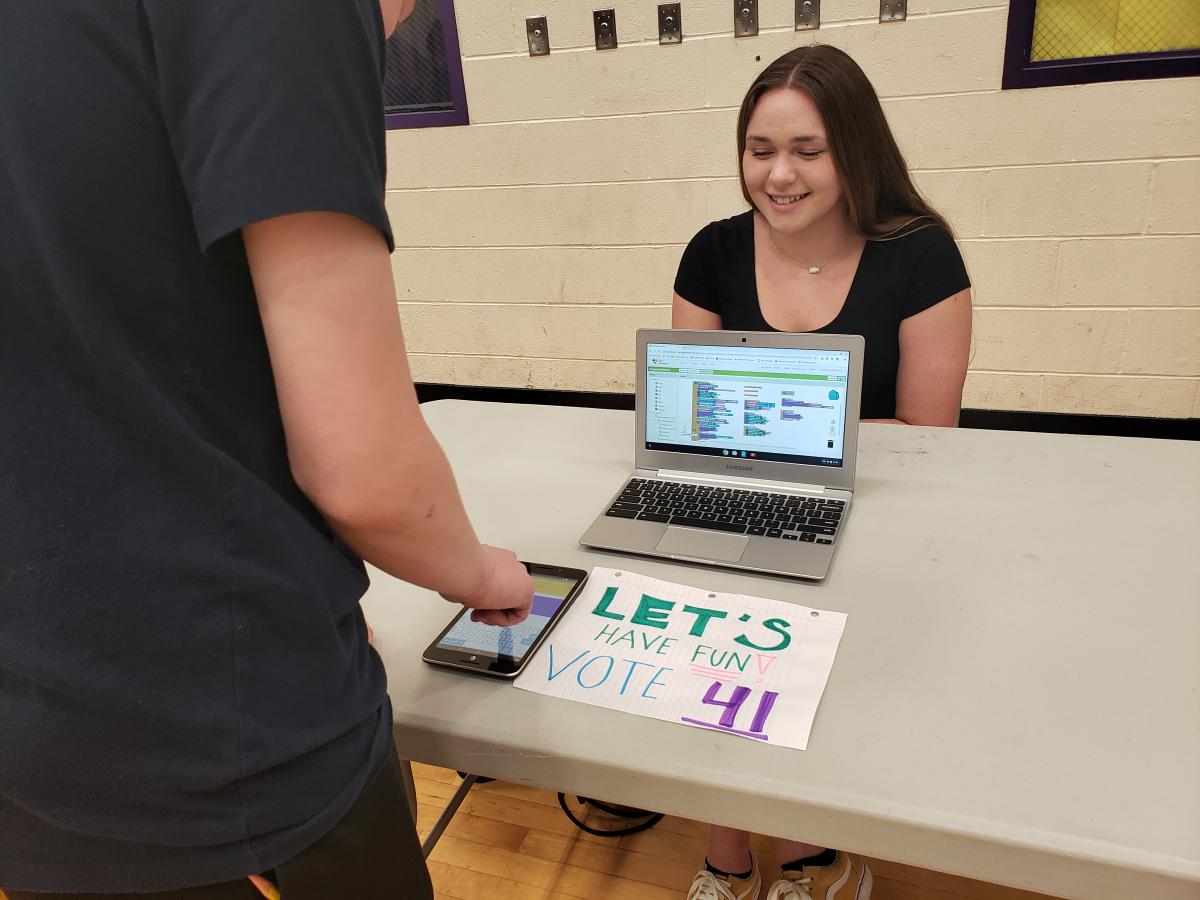
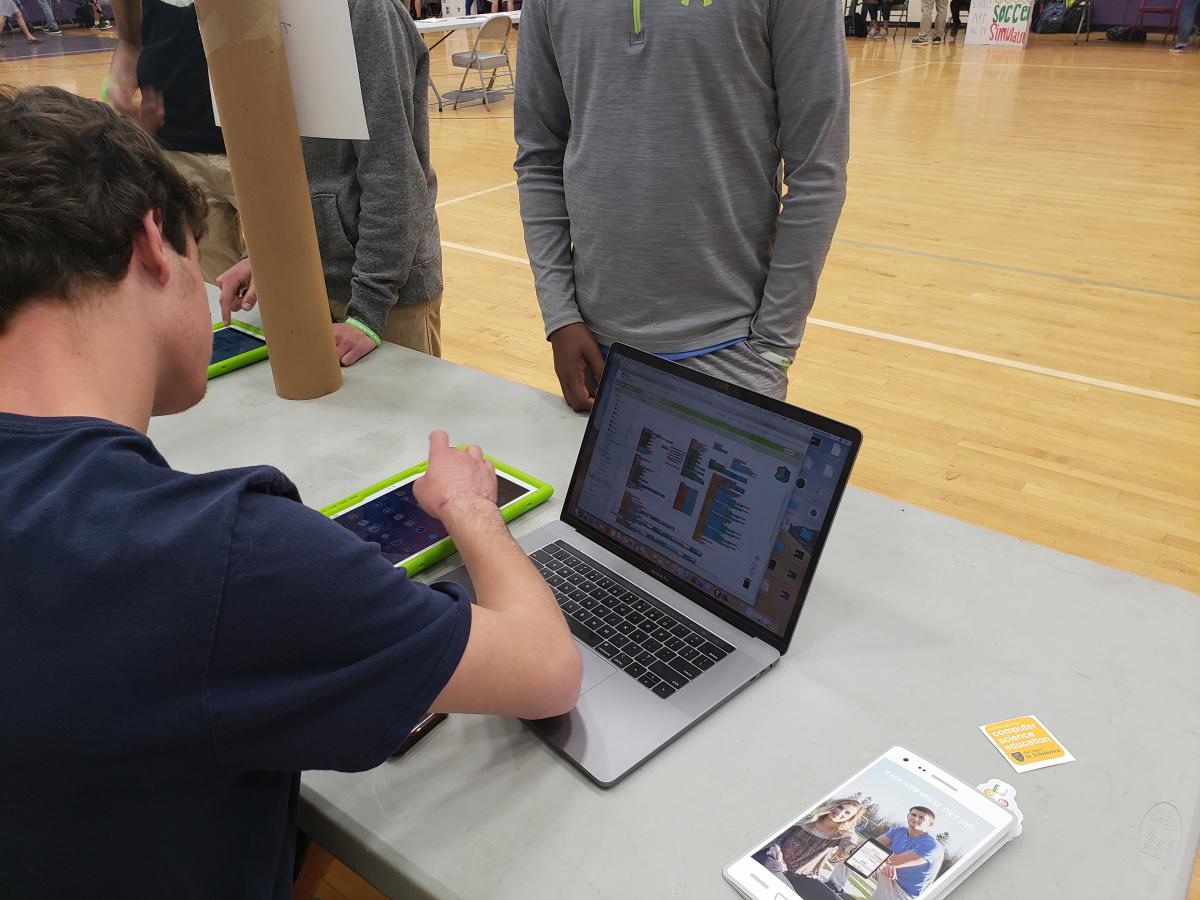
On Wednesday, May 22, 2019 the 6th Annual Mobile CSP Expo was held at Westhill High School in Stamford, CT. Students who were enrolled in the Mobile CSP course during the 2018-2019 academic year were invited to demonstrate the apps they had created during the course under the guidance of trained Mobile CSP teachers. Approximately 70 students from five Connecticut high schools participated in the event.
A special thank you to our 2019 sponsor!:

Mobile CSP Students Perform Well on 2018 AP CSP Exam
Congratulations Mobile CSP teachers and students!
The official results are in and Mobile CSP students performed very well on the 2018 AP CSP exam. Out of 73,732 students who took the 2018 exam, 4,031 (5.4%) were part of a course using the Mobile CSP syllabus and 76.2% of Mobile CSP students passed with a grade of 3, 4, or 5, compared to 68.9% for all students. In the following chart Mobile CSP students are shown in blue and are compared to the performance of all students. 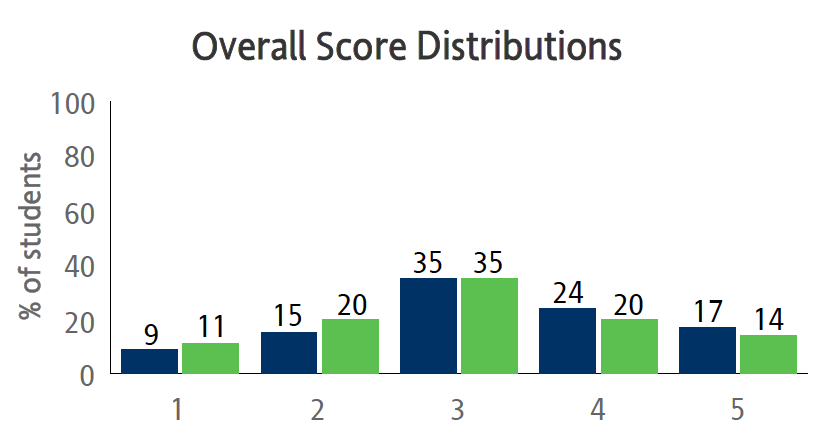
For the multiple choice part of the exam, the College Board divides all students evenly into quartiles and then calculates the percentage of our students who fall into each quartile. As this chart shows, 32% of Mobile CSP students scored in the top quartile, while only 21% or our students scored in the bottom quartile. These are good results.
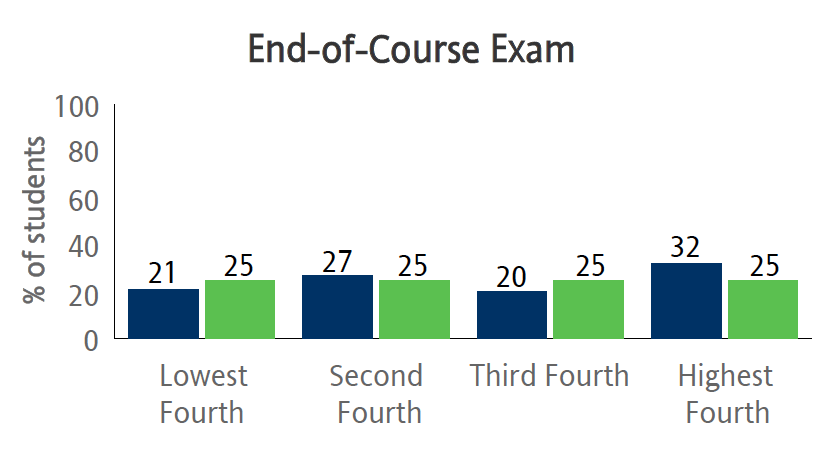
On the performance task portions of the exam, Mobile CSP students did even better, with 33% of our students scoring in the top quartile and only 17% in the bottom quartile. 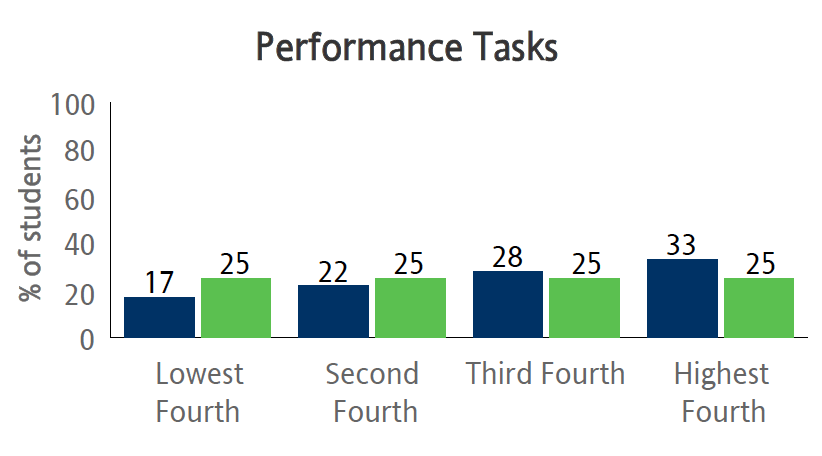
Performance by Content Area
The College Board report (link below) provides a breakdown of student performance by content area (e.g., Algorithms, Abstraction, Programming, etc.). In every one of the 15 content areas reported for the multiple choice exam and the 5 areas reported for the performance tasks, Mobile CSP students performed at or higher than the global average. For example, in the area of Abstraction 1,475 (36.6%) Mobile CSP students scored in the top quartile compared to all students. And in the Create Task Apply Algorithms area 1,609 (39.9%) scored in the top quartile. These are very strong results.
Performance by Demographic Group
The College Board has not yet given us a demographic breakdown of the Mobile CSP cohort. We will update this summary when we receive those data.
For more details, here’s a link to the original report from the College Board.
Congratulations to all our students and teachers!
College of St. Scholastica faculty and staff host Counselors for Computing Training
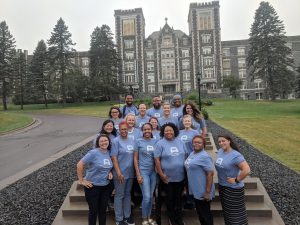
Duluth, MN. July 28 – August 1, 2018– Counselors from across the United States participated in the CS@CSS event at the College of St. Scholastica, a professional development opportunity provided by the National Center for Women & Information Technology (NCWIT) Counselors for Computing (C4C) program. Faculty (Jennifer Rosato and Tom Gibbon) and staff (Cassandra Broneak) at the College of St. Scholastica helped to organize this learning opportunity and supported those who were in attendance. This C4C training provided school counselors with information and resources they can use to support all students as they explore computer science (CS) education and careers.
Focus was placed on training the high school counselors to learn the importance of increasing CS access and opportunities for underrepresented students. Technology increasingly permeates every aspect of society and provides the foundation for most modern innovation, yet too few students are pursuing computing education or careers. If they are to get the exposure and encouragement they need, it is essential that counselors get up to speed on the knowledge and resources necessary to guide effectively. (www.ncwit.org/thefactsgirls.)
About NCWIT
The National Center for Women & Information Technology (NCWIT) is a non-profit community of more than 1,100 universities, companies, non-profits, and government organizations nationwide working to increase girls’ and women’s meaningful participation in computing. NCWIT equips change leaders with resources for taking action in recruiting, retaining, and advancing women from K–12 and higher education through industry and entrepreneurial careers. Find out more at www.ncwit.org/.
About the College of St. Scholastica
The College of St. Scholastica is an independent private college with locations across Minnesota, including the original campus in Duluth. Enrollment in the undergraduate and graduate programs has grown from 2,200 to 4,000 in the last decade, due, in part, to their commitment to making high-quality education available online and through convenient evening and weekend formats. The College of St. Scholastica hosts important CS education grants such as Mobile Computer Science Principles (CSP), a College Board AP CSP endorsed curriculum and professional development provider, and the TeachCS@CSS program. Approved in spring of 2018, the College of St. Scholastica will also be home to a new Center for Computing which will focus on expanding CS opportunities for students from all backgrounds and experience levels.
Mobile CSP’s 5th Annual App Expo
Breaking News:
The Mobile CSP expo was featured during the 6pm showing of WFSB 3 News on Tuesday, May 22nd. Congratulations to everyone involved!
On Tuesday, May 22, 2018 the 5th Annual Mobile CSP Expo was held at Trinity College in Hartford, CT. Students who were enrolled in the Mobile CSP course during the 2017-2018 academic year were invited to demonstrate the apps they had created during the course under the guidance of trained Mobile CSP teachers. Approximately 60 students from five local high schools participated in the event.
College of St. Scholastica and Trinity College to Participate in 2018 NSF’s STEM for All Video Showcase to Highlight Innovation in STEM Education
College of St. Scholastica and Trinity College to Participate in 2018 NSF’s STEM for All Video Showcase to Highlight Innovation in STEM Education
Mobile Computer Science Principles (CSP) from College of St. Scholastica and Trinity College will be featured May 14th-21st at http://stemforall2018.videohall.com. Video Mobile CSP’s video and vote today: http://stemforall2018.videohall.com/presentations/1121
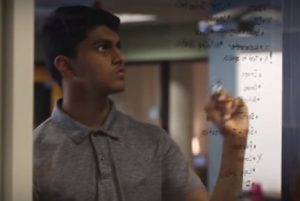
Hartford, CT, 2018 — Pauline Lake, Teaching Consultant at Mobile CSP will be featured in the 2018 STEM for All Video Showcase funded by the National Science Foundation. The event will be held online May 14th -21st at http://stemforall2018.videohall.com.
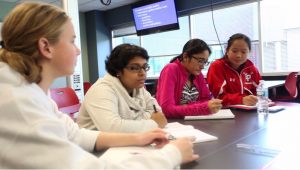
The presentation, entitled “Mobile CSP: Using Mobile Apps to Engage Students in CS,” looks at how engaged students are when learning about Computer Science (CS) through a lens that they are familiar with: Mobile phones! Mobile CSP began, officially, in 2013 with an NSF grant at Trinity College in Hartford, CT. Since then the project is now serving more than 600 teachers and 10,000 students nationwide!. The project was funded by the National Science Foundation.
Now in its fourth year, the annual showcase will feature over 200 innovative projects aimed at improving STEM learning and teaching, which have been funded by the National Science Foundation and other federal agencies. During the weeklong, event researchers, practitioners, policy makers and members of the public are invited to view the short videos, discuss them with the presenters online, and vote for their favorites.
The theme for this year’s event is “Transforming the Educational Landscape.” Video presentations cover a wide range of topics including science, mathematics, computer science, engineering, cyberlearning, citizen science, maker spaces, mentoring, informal learning, professional development, research and evaluation, NGSS and the Common Core. The videos highlight initiatives for students of all ages – kindergarten through graduate school, as well as those for adult learners.
Last year’s STEM for All Video Showcase is still being accessed, and to date has had over 51,000 unique visitors from over 189 countries.
The STEM for All Video Showcase is created and hosted by TERC a non-profit, research and development organization, located in Cambridge MA. TERC partners with six NSF funded resource centers MSPnet, CADRE, CAISE, CIRCL, STELAR, CS for All Teachers. The Showcase is funded by a grant from the National Science Foundation (#1642187)
Check-out these teachers’ work in Mobile CSP
Mobile CSP knows that without the commitment, support, and hard work of teachers, students from all backgrounds and experience levels would not have access to computer science. Currently, 981 users are registered for the Mobile CSP teacher materials site and 13,172 people are registered on our student materials site (includes both teachers and students). As our program and the mission of CS for All grows, we would like to honor the work of computer science teachers. To acknowledge their dedication in the classroom, the experiences and stories of a few select teachers who are currently implementing the Mobile CSP curriculum are shared below.
Are you or someone you know currently implementing the Mobile CSP curriculum? Are your students making great strides in the Mobile CSP course?
Would you like to share your professional development experience, teaching insights, or the apps your students have created? Complete a Teacher Feature today!
Teaching this course has lit a fire in me again.
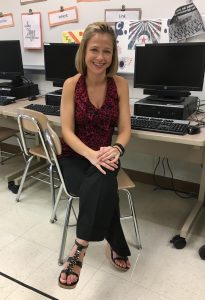
Cindy Moshman-Southworth, who completed the online professional development in the summer of 2017, is currently teaching the Mobile CSP curriculum at Patchogue-Medford High School in New York. She describes the course as fun and interactive, “(Mobile CSP) lit a fire in me again. I’ve been teaching CS for 19 years now. It made me happy to be here again.” Her students have enjoyed creating real mobile apps and sharing their experiences outside of the classroom. Cindy stated she would recommend the professional development to any teacher: “The PD was hard but it really made a big difference in my confidence and helped me to effectively teach the course. The practices and tactics learned in the professional development are really helpful even in the other classes I teach. I use the practices Mobile CSP uses to develop and improve. I’ve learned so much.” She stated that her Master Teacher, Lukas Gill, has been supportive and helpful throughout her experience.
Read Cindy’s full testimonial here.
Teamwork approach encourages students to succeed.
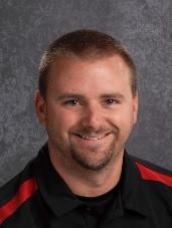
After completing the summer 2017 online professional development, Brad Haugen has brought the Mobile CSP curriculum to students at Fairmont Junior and Senior High School in Minnesota. His students have enjoyed the project-based learning nature of the course and have enjoyed the creative freedom the course offers: “They enjoy the challenge of not just finding the answer but being able to go through the programming steps and learning how to create apps in a different, fun way.” Brad stated that the word of mouth among is students is amazing and students are excited to share their experiences with others. We asked Brad to share his insights and advice with teachers who may be considering implementing Mobile CSP. He stated, “You do not have to be a master at computer programming. Everyone can and will learn how to teach this course effectively. The summer professional development allowed me to make mistakes. It’s important to learn how to make mistakes in front of students. You learn how to work through problems with students and it builds a teamwork approach in the classroom. You may not have all of the answers and it’s ok to let your student know that. It has empowered me as an educator and my students as learners.” Brad has been selected to work with the Mobile CSP curriculum development team for the 2018-2019 academic year.
Read Brad’s full testimonial here.
Inspiring students to pursue careers and futures in working with computer science.
Abigail Cooksey currently teaches at Shiprock High School in New Mexico. Abigail completed the summer 2017 online professional development and was chosen as a recipient for the NCWIT Educator Award. Her students received 4 Regional Runner Ups, 2 Regional Winners, and 1 National Runner up for NCWIT. She learned about Mobile CSP from the Teach For America Exploring Computer Science fellowship. She stated that she appreciates that “Mobile CSP can be customized to students.” Abigail teaches in a rural school district and has acknowledged the challenges that her students face in and out of the classroom. “It’s important to me that all of my students are included and have opportunities to learn. This course includes all students even those who may not have internet at home.” Abigail spoke to how the unplugged lessons and the opportunities for pair programming are teaching students valuable programming lessons while also accommodating their situations. She also acknowledged how having students work on their cell phones has created higher levels of engagement and accessibility in her classroom. “If you’re a teacher working a a rural area you need to have a back up plan to teach computer science. With Mobile CSP, what you need is already there. It’s easy to create programs where you sit students in front of a computer but Mobile CSP gives you the option to customize the course to your school and classroom.” Abigail is making wonderful strides in including all students regardless of background or previous experience. “When it comes to working with women I think of my own experience and how I left a math degree because I didn’t feel included. My goal, and the goal of all computer science, should focus on showing women that we can and have been doing this for a long time. We need to prepare them to be aware of what they’ll face and empower them to have the skills the create their own space even if one doesn’t exist yet.” Continue reading “Check-out these teachers’ work in Mobile CSP”
Nice Coverage of Mobile CSP Classroom on WTNH
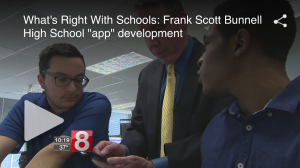
A team of students from Frank Scott Bunnell High School in Stratford, Connecticut, under the leadership of Mobile CSP teacher, Rachelle Pedersen, was featured recently in a nice story on WTHN out of New Haven, Connecticut (View the story).
The story was part of WTNH’s What’s Right with Schools series and featured students using App Inventor to “create technology that affects and improves people’s lives,” a key feature of the Mobile CSP course.
According to the story, the Mobile CSP class is a favorite among students. Ms. Pedersen is a first-year CS teacher who attended the 2017 Mobile CSP Professional Development course at Southern Connecticut State University in summer 2017. (Information on the 2018 PD program.)
Mobile CSP shows computer science can be fun, easy
The U.S. Department of Labor estimates that by 2020, there will be more than 1.4 million computer-related job openings in the United States. At the current graduation rate though, only about 30 percent of those jobs will be filled with U.S. computing bachelor graduates.
To increase interest and graduate numbers, Mobile Computer Science Principles (CSP) is helping high school teachers and students see how fun, easy and engaging computer science education can be for most anyone.
“I like teaching Mobile CSP because it opens my students’ eyes to how technology influences almost everything around them,” said Scott Kaminski, a teacher at Trumball (Conn.) High School who has introduced more than 130 students to the course. “This curriculum covers a wide range of topics, which makes it easy for teachers to reference current events and the interests of their students. This creates something real for students, which makes the topics and concepts more accessible for them.”
Mobile CSP is a College Board endorsed AP Computer Science Principles course that works to engage high school students, enhance writing and communication skills and foster collaboration and creativity. In 2017-18 alone, there are more than 600 teachers and 10,000 students using Mobile CSP curriculum.
With an extra push to get teachers and kids excited about the program, Mobile CSP is participating in CSEd Week, Dec. 4-10. According to the csedweek.org website, only 35 states allow students to count computer science courses toward high school graduation. There are currently 486,686 open computing jobs nationwide but only 42,968 computer science students graduated into the workforce last year.
“…perfect course for kids who like using the computer but are nervous about computer science.”
Mobile CSP is working to change those numbers, starting with encouraging teachers to bring an accessible version of computer science into the classroom.
“It’s a perfect course for kids who like using the computer but are nervous about computer science,” said Sarah Spaunhorst, a teacher at Visitation Academy, St. Louis, Mo. “It does such a good job of explaining the main concepts of computer science without pressure.”
In celebration of CSEd Week, Mobile CSP is offering a new Hour of Code activity called Play That Tune. For the activity, students will build code to play the tunes given in puzzles, and after all levels are completed, students can create their own tune. Finally, the code can be packaged as an Android app. Participants can also try MIT App Inventor. By requesting a kit from Mobile CSP, teaches will receive stickers, posters, handouts and promotional information.
Coding and Mobile CSP isn’t just about having fun though. With Mobile CSP, students build apps with real world solutions to local community problems. For example, one group of students built an app to report gang activity in their community. And, for some students, it could change their career path or outlook.
“Fun, easy to pick up, and rewarding.”
“The feedback that I receive about the class is that it is fun, easy to pick up, and rewarding. I have had a handful of students say that they may pursue computer programming as a career now because of this class,” said Griswold (Conn.) High School teacher Andrew Meislitzer, who has taught about 20 students Mobile CSP.
Mobile CSP offers continuing education for teachers either online or at regional sites around the country, including The College of St. Scholastica (Duluth, Minn.). Once teachers have completed the course, they are ready to share the added knowledge with their students.
To find out more about Mobile CSP or how to sign up for the course and materials, visit mobile-csp.org.
